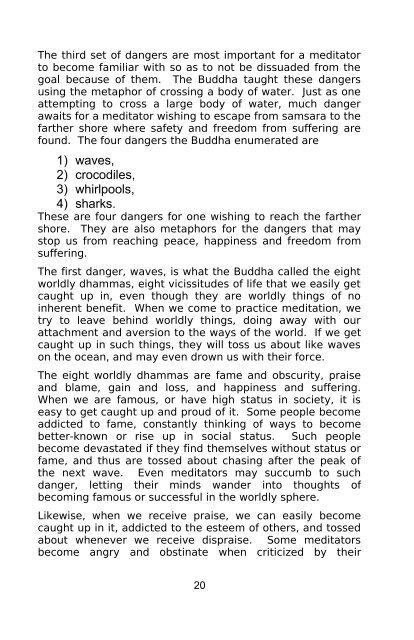Lessons In Practical Buddhism - Sirimangalo.Org
Lessons In Practical Buddhism - Sirimangalo.Org
Lessons In Practical Buddhism - Sirimangalo.Org
You also want an ePaper? Increase the reach of your titles
YUMPU automatically turns print PDFs into web optimized ePapers that Google loves.
The third set of dangers are most important for a meditator<br />
to become familiar with so as to not be dissuaded from the<br />
goal because of them. The Buddha taught these dangers<br />
using the metaphor of crossing a body of water. Just as one<br />
attempting to cross a large body of water, much danger<br />
awaits for a meditator wishing to escape from samsara to the<br />
farther shore where safety and freedom from suffering are<br />
found. The four dangers the Buddha enumerated are<br />
1) waves,<br />
2) crocodiles,<br />
3) whirlpools,<br />
4) sharks.<br />
These are four dangers for one wishing to reach the farther<br />
shore. They are also metaphors for the dangers that may<br />
stop us from reaching peace, happiness and freedom from<br />
suffering.<br />
The first danger, waves, is what the Buddha called the eight<br />
worldly dhammas, eight vicissitudes of life that we easily get<br />
caught up in, even though they are worldly things of no<br />
inherent benefit. When we come to practice meditation, we<br />
try to leave behind worldly things, doing away with our<br />
attachment and aversion to the ways of the world. If we get<br />
caught up in such things, they will toss us about like waves<br />
on the ocean, and may even drown us with their force.<br />
The eight worldly dhammas are fame and obscurity, praise<br />
and blame, gain and loss, and happiness and suffering.<br />
When we are famous, or have high status in society, it is<br />
easy to get caught up and proud of it. Some people become<br />
addicted to fame, constantly thinking of ways to become<br />
better-known or rise up in social status. Such people<br />
become devastated if they find themselves without status or<br />
fame, and thus are tossed about chasing after the peak of<br />
the next wave. Even meditators may succumb to such<br />
danger, letting their minds wander into thoughts of<br />
becoming famous or successful in the worldly sphere.<br />
Likewise, when we receive praise, we can easily become<br />
caught up in it, addicted to the esteem of others, and tossed<br />
about whenever we receive dispraise. Some meditators<br />
become angry and obstinate when criticized by their<br />
20












